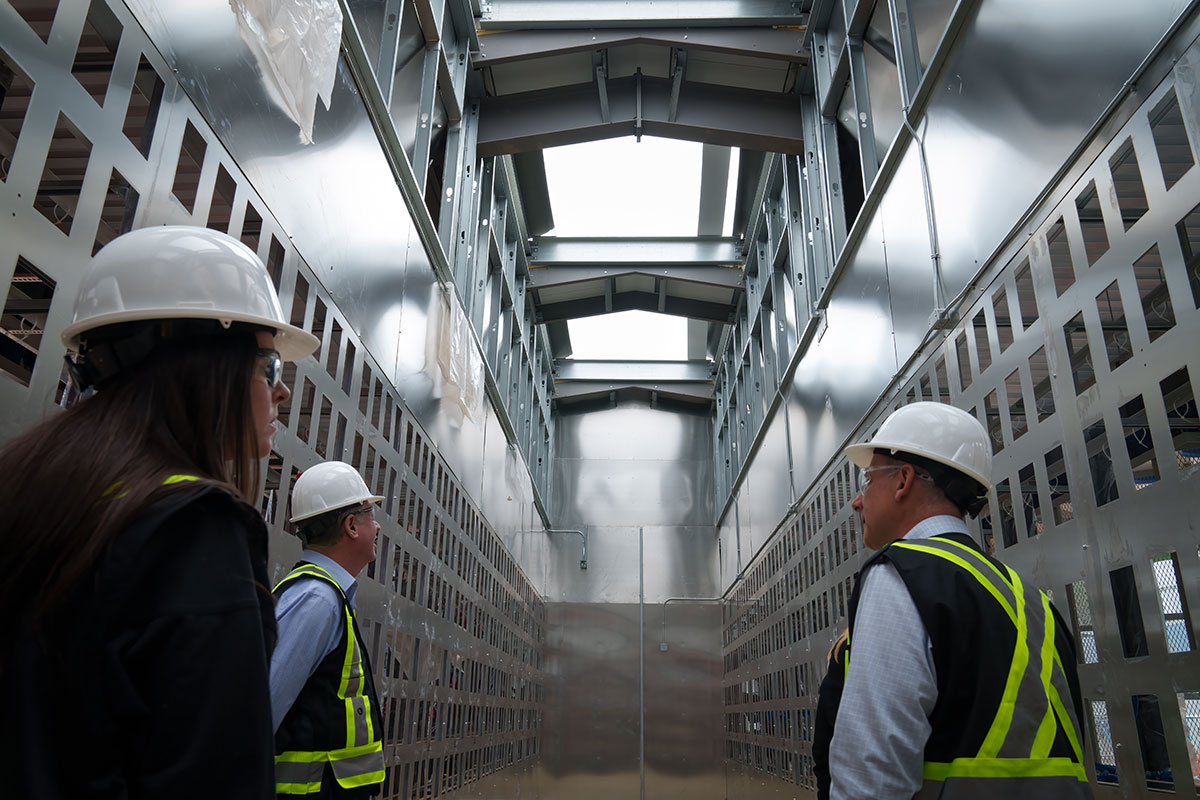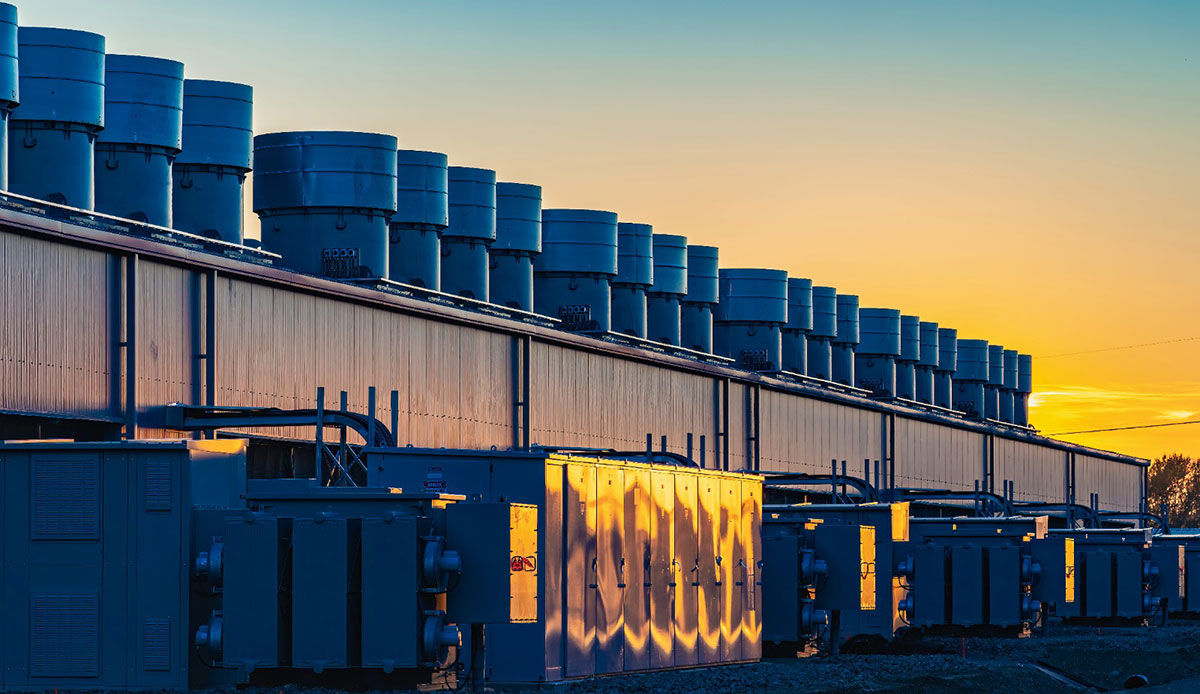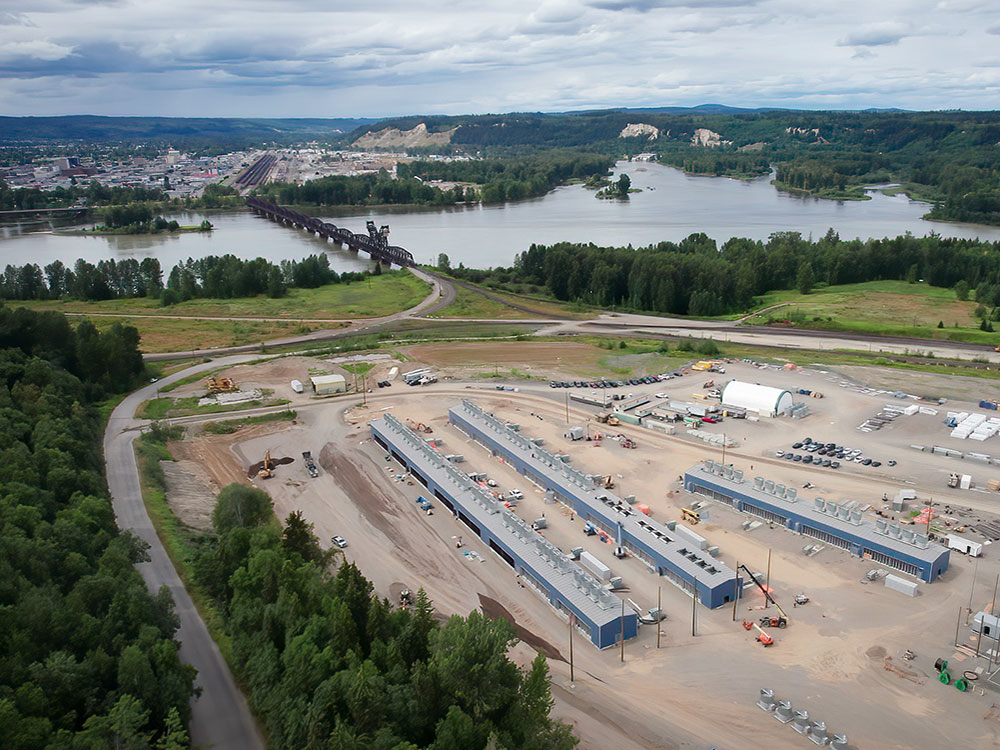When most people think about bitcoin, they likely think of a shiny new tech industry that operates somewhere in “the cloud.”
Most aren’t imagining an old mill site in the village of Canal Flats, B.C., population 668.
But over the past five years, cryptocurrency operators have increasingly been setting up shop in the sawdust left by B.C.’s declining forest industry. Inside warehouses that house the operations, the steady hum of computers and a web of wires log thousands of transactions that ping around the globe daily. Their polished stainless-steel interiors reflect a glimmer of hope for communities in decline.
But the crypto industry has also seen peaks and valleys in recent years — and not just those of rural B.C.
Bitcoin, which makes up almost 40 per cent of all cryptocurrencies, has become increasingly known for its heavy environmental footprint, with the massive computers required to run the industry drawing more power than countries such as Finland and Chile.
That has brought bitcoin miners to B.C. in search of greener energy. They require three things: sufficient space, a renewable power source and an internet connection. They’ve found it in the old mill sites and industrial infrastructure of forestry towns — places like Houston, Ocean Falls and, of course, Canal Flats.
But the jobs provided by the industry — a few hundred provincewide, by one estimate — haven’t come close to replacing the void left by forestry. The province’s biggest bitcoin miner, Australia-based Iris Energy, provides about 60 jobs. The company has also been hit by bitcoin’s recent downturn, which has led to a drop in production and fear of layoffs. It now faces a class-action lawsuit in the U.S.
B.C.’s Ministry of Energy, Mines and Low Carbon Innovation says its announcement last month that it would pause new power requests from cryptocurrency operations has nothing to do with the industry’s volatility and everything to do with preserving B.C.’s power supply.
“Cryptocurrency mining consumes massive amounts of electricity to run and cool banks of high-powered computers 24/7/365, while creating very few jobs in the local economy,” B.C.’s mines minister, Josie Osborne, said in a news release. Yet unlike mineral mining, which undertakes an approval process under B.C.’s Mines Act, crypto miners only need to request power from BC Hydro.
Seven existing cryptocurrency mining operations and six in the advanced stages of development will be allowed to proceed under the new rules. The province says it is pausing 21 additional projects that are requesting a total of 1,403 megawatts — more than 10 per cent of the province’s power supply, equivalent to approximately 570,000 homes or 2.1 million electric vehicles.
The ministry declined to provide details on operations in the province, calling the information “commercially sensitive.”
It says the 18-month suspension will provide time to create a “permanent framework” for the industry — and to preserve its electricity supply for things like electric vehicles and greening B.C.’s existing economy.
‘It’s like gold 2.0’
Daniel Roberts visibly stiffens at the mention that bitcoin may be a volatile asset.
The co-founder and co-CEO of Iris Energy, a company he started with his brother, Will, got his first taste of bitcoin in 2013. Roberts invested just as the digital currency, which had been in existence for about five years at that time, approached $1,000 a coin. Months later, following a high-profile internet security breach, bitcoin plummeted and Roberts’ investment lost nearly half its value.
“I thought, ‘This is nonsense’ and sold it all,” the Australian entrepreneur says over a Zoom call from his home in Sydney, jokingly referring to the currency as “silly, magic internet money.”
“How wrong I was,” he says.
As Roberts points out, despite bitcoin’s undulating value, the digital currency has trended upward over the past decade. Today, a single coin is worth about C$28,000 — well above what Roberts paid a decade ago but a far cry from its peak of C$80,000 in 2021.
“It’s like gold 2.0,” Roberts says. “What gives gold value? Transferability, scarcity, divisibility, durability — it’s objectively better at being gold than gold is.”
But some economists disagree.
Werner Antweiler, an associate professor at the University of British Columbia’s Sauder School of Business, has been studying bitcoin since its early days. In a 2011 blog post, he called the currency a terrible idea.
A decade later, his opinion hasn’t changed.
“It looks a lot like a Ponzi scheme,” he says. “A lot of people, economists like myself, have looked at it and said, ‘Wait a minute. This is not a sound business model.’”
For many, bitcoin’s appeal is that it operates outside traditional markets. It’s not controlled by governments or other regulatory bodies, and its distributed ledgers mean that each transaction is duplicated multiple times around the world. Those ledgers create a blockchain, a history of each transaction meant to provide duplicity and security, and its decentralized nature is appealing to those who distrust central banks.
The product has no intrinsic value — or even physical presence. Its value relies solely on the worth assigned by markets. As a result, it leans heavily on hype.
“In that sense, it’s like buying a piece of art or gold or something, that is essentially just an asset we hold and sell,” Antweiler says. “Whether or not it’s good and holding value, that is completely driven by the market.”
Here in B.C., Antweiler estimates the industry may provide “a few hundred jobs.” But what makes it so egregious, he says, is its wastefulness.
“When you look at how much electricity is now being used for bitcoin mining around the world, it’s absolutely shocking,” he says. “I have not yet found anyone who can point me to any significant economic value that could come from using any of these crypto tools or crypto assets and that is, unfortunately, the bottom line.”
‘Mopping up’ surplus energy in mill towns?
Cryptocurrency operations first began plugging into the B.C. power grid in 2018.
China had recently shifted from being the global epicenter of cryptocurrency mining to banning the operations in 2017. As some operators sought to green the industry’s image, they looked to B.C., which appeared to have an abundance of renewable power.
The province’s total generating capacity is more than 12,000 megawatts. An additional 1,100 megawatts are projected to come online once the Site C hydroelectric project is completed in 2024. BC Hydro says its power is 98 per cent renewable, most of it from the province’s many dammed waterways.
At the start, B.C. cryptocurrency operations drew just a handful of megawatts from the grid. The province appeared keen to attract new business, initially considering a “load-attraction” rate for new cryptocurrency operations.
But it quickly changed course.

BC Hydro commissioned a load forecast study in 2018 reporting that, by September of that year, formal service requests had grown to 87 megawatts. But the province faced inquiries totalling nearly 2,000 megawatts — roughly a sixth of its total power supply.
The report described cryptocurrency as an “emerging” industry, alongside cannabis, that was expected to accelerate demand for power, albeit with a significant amount of uncertainty. “This is acutely the case for cryptocurrency,” the report added. “The business viability is ultimately dependent on cryptocurrency prices which are extremely volatile.”
Despite early indications that BC Hydro might offer incentives to cryptocurrency operations, when it announced its Clean Industry and Innovation Rate in 2021, which aimed to attract clean tech industries, it explicitly excluded cryptocurrency.
That’s “due to the number of crypto requests to connect,” which showed unprecedented interest from the industry without any incentives, the provincial power regulator explained in an email to The Tyee.
It was into this shifting landscape that Iris Energy stepped in 2019.
According to Roberts, B.C. was facing the combined effects of a declining forest industry coupled with expanded hydroelectric infrastructure. He says the province had a surplus of renewable energy, something that was actually costing ratepayers money.
“When you had the pulp and paper industry shut down and the province continued to build out Site C, you end up with this enormous oversupply of energy that someone still has to pay for,” he says. “So, we thought, let’s come in, let’s go into these regional towns where they’ve been decimated economically by the closure of these mills, leverage a lot of the existing electrical infrastructure, rehire a number of the local workers, retrain them in what we do.”
The company was “mopping up some of that surplus power” and providing BC Hydro with an alternative revenue line, relieving the burden on residents, Roberts says.
At the same time, it was greening the bitcoin industry, he adds.
Antweiler calls the claims “complete greenwashing.” He says the idea that B.C.-based operations are reducing bitcoin’s environmental footprint goes against the very nature of the industry.
“You can’t do bitcoin mining only in B.C. That is impossible by the nature of the transaction. The moment bitcoins are mined, they’re mined everywhere,” he says. “It’s the global footprint that matters.”
In an email, BC Hydro says that it sells any surplus energy to Powerex, its energy trading branch, which sells clean energy in the western U.S. and Mexico at average wholesale market prices, providing revenue to the Crown corporation.
‘The big economic driver is still the forest industry’
Iris Energy currently operates three of B.C.’s seven operating cryptocurrency facilities — in Canal Flats, Mackenzie and Prince George. Combined, they draw 160 megawatts, about 60 per cent of the power dedicated to 13 operations that have been allowed to move forward since the province announcement it would hit pause on new connection requests.

It was a connection with Vanderhoof businessman Brian Fehr that originally brought the company to B.C., Roberts says.
Fehr, an Order of BC recipient, had been buying up old mill sites across the province — in places like Vavenby, Cranbrook, Isle Pierre and Fort Nelson. Among them was a shuttered Canfor sawmill in Canal Flats, which he retooled as the Columbia Lake Technology Center in 2018, with then-premier John Horgan in attendance at the launch.
The following year, Iris Energy bought into the venture, establishing its first Canadian operation, which officially launched in 2021.
At the time, Fehr spoke enthusiastically about more bitcoin operations on the horizon: “We’re already building in Mackenzie, we’re already working in Chetwynd, we’ve got many sites going now,” he said. “We went after sites where BC Hydro has a surplus of power.”
But while Fehr remains an investor in Iris Energy, he is not directly involved in the company’s two recent operations, which opened last year in Mackenzie and Prince George. No operations have yet materialized in Chetwynd, although Fehr bought the town’s sawmill site in March.
Roberts says he can’t talk about the company’s future plans in B.C. but indicates that more mining facilities — and partnerships with the Brian Fehr Group — could be in the works.
“We’ve got a number of other development projects that we’re working on with Brian,” he says.
Fehr did not respond to The Tyee’s requests for an interview.
Brian Fehr’s sister, Lorri Fehr, is CEO at the Columbia Lake Technology Center and works with her brother on his various business ventures across the province. She says bitcoin was “not our first strategy.” The family comes from a forestry background and their interests focus on providing economic development opportunities in rural communities.
But when the siblings met the Roberts brothers, something clicked.
“What mattered there was the shared values,” she says. “We had decided very clearly at the beginning of the Columbia Lake Tech Center that we were only going to offer clean, green, sustainable, First Nations-friendly, community-friendly — that’s what we want our site to be. These guys from Australia came and they really clicked with those values.”
In addition to providing about 20 full-time jobs, she says Iris Energy has offered locals in Canal Flats the opportunity to learn entry-level tech skills. Canal Flats Mayor Mark Doherty adds that infrastructure upgrades have also attracted the interest of other technology companies.
“It does help out the economy here. We would like to see more of that stuff coming here,” Doherty says. “They employ a lot of people and they’ve been a good steward of the community.”
Ironically, while the tech industry has supplied some new employment, it has also taken it away — the Canal Flats mill had 120 workers when it closed, Doherty says. If it were to start up again today, it would employ fewer than 70 people, a result of technological efficiencies in the forest industry — but still three times the number of jobs offered on the site as a crypto operation.
Mackenzie Mayor Joan Atkinson is also quick to acknowledge that bitcoin isn’t about to replace what was lost with a decline in the forest industry.
Atkinson moved to the community more than 25 years ago for her husband’s work in forestry. Her two sons, now grown but still living in the region, also went on to work in the industry.
The community of roughly 3,200 residents was founded on forestry. Located two hours north of Prince George, it was one of B.C.’s instant towns, created to service logging operations after the Williston Reservoir opened up new timber to the north. When Atkinson arrived in the late 1990s, there were three sawmills, a large pulp and paper mill and a pulp mill, she says.
That all changed with an uplift in timber harvest during the mountain pine beetle epidemic and subsequent hauling of timber to mills farther afield. Canfor’s Mackenzie mill closed in 2019, eliminating more than 400 local jobs.
“But the big economic driver is still the forest industry,” she adds.
Today, the community has a lot going for it, Atkinson says. Real estate prices are among the lowest in the province and it has enough family doctors for everyone. In addition, the town offers easy access to outdoor adventure, with new bike trails, paddling and its own one-lift ski hill.
Iris Energy employs about 15 people full time in Mackenzie. They’re jobs Atkinson says the community is happy to take. The company has also purchased industrial land from the district, provided $100,000 in annual community grants and contributes to the tax base — even if it’s not on the same scale as heavy industry.
She describes the company as “good corporate citizens.”
“It certainly doesn’t fill the void of a shutdown sawmill,” she adds. “We’re used to the old sawmill days when 40 people showed up for a shift.”
Industry instability — and lawsuits
Provincewide, Roberts says Iris Energy employs about 60 people — 10 in Vancouver and the rest spread over its three operations.
“We’ve hired locally, we’ve sourced all our trades and equipment where we can locally and, again, we’d like to think that we’ve contributed to keeping power prices low,” he says. “We don’t employ as many people as the pulp and paper industry. But at least we’re coming into these regional communities, adding economic activity and a new level of employment.”

But last year’s downturn in bitcoin underscored the industry’s instability.
On Nov. 2, Iris Energy announced that as a result of the drop in bitcoin prices, some equipment was not producing enough revenue to cover more than $100 million in debt on the machines. The loans, which were arranged through “special purpose vehicles,” or subsidiaries that provide financing protection to the parent company, were called in by the lenders.
Roberts says that the company is currently “replacing some of the computers” in Canal Flats as a result.
It means output is down. The company’s hashrate, or computing power, dropped by more than half from October to November 2022.
Despite rumours that the Canal Flats operation could see layoffs, that hasn’t happened, he says.
“It’s given the guys on site a bit of a breather and an opportunity to catch up on broader things,” Roberts says. “It means we’re making less cash today than we would have been three months ago, but it’s very much a short-term thing.”
Following the November announcement, Iris Energy stocks tumbled to an all-time low. By late December, they bottomed out at US$1.06 — losing more than 90 percent of their value over November 2021, when the shares entered the market at US$28.
Last month, the class-action lawsuit filed in the U.S. claimed Iris Energy “failed to disclose material adverse facts” about its business, thereby harming investors. The claims have yet to be proven before the court.
When asked about the lawsuit, Roberts demurs.
“I would have to check. I know for a fact that one was lodged and withdrawn very quickly late last year,” he says, blaming market fluctuations and investor anxiety. “Whether there’s another one afoot today, I’d need to go and check. It’s not something that we’re overly concerned with at the moment,” he adds.
Robert Willoughby, investor relations manager with Pomerantz LLP, one of the law firms pursuing the court action against Iris Energy, confirmed that a class-action against Iris Energy is moving ahead.
BC Hydro expresses caution
Both bitcoin and Iris Energy appear to be rebounding with the new year. Bitcoin’s price has climbed from $22,000 a month ago to $28,000 this week. Iris Energy shares closed at US$1.92 on Wednesday, up from a low point of US$1.06 in December.
Roberts is optimistic. “I think bitcoin is here to stay,” he says, but adds that the infrastructure being built could be used for all types of data.
Although the Mines Ministry says bitcoin’s recent downturn had no bearing on its decision to halt new operations, BC Hydro expressed caution about dedicating too much of its power supply to the industry. Moving ahead with the spike in requests would have meant “significant upgrades” to the province’s energy delivery systems, at a cost to consumers, senior media relations advisor Kyle Donaldson adds.
“We are committed to keeping rates affordable for our customers and protecting them against a volatile industry that could potentially reduce electricity supply,” he says. “We have heard from communities and individuals about recent concerns over the state of the cryptocurrency industry and the risks of allocating electricity that puts significant risk on other industries they are looking to attract to their region.”
Roberts says that BC Hydro’s announcement — which came as the province broke records for residential power use during December’s cold snap — didn’t come as a surprise.
“We get it. We welcome it,” he says. “At the end of the day, we want to be solving problems in markets that we go into, we want to be using surplus energy.”
Manitoba also suspended new cryptocurrency connections in November and Hydro-Québec previously undertook a similar process that resulted in higher rates and a cap on electricity for cryptocurrency mining.
As for what B.C.’s current pause could bring, the Mines Ministry says it’s too soon to say. Antweiler notes that financial regulation ultimately comes from the federal government.
He adds that now is not the time to be expending energy on a product with questionable value.
“Anyone who’s concerned about climate change can only look at crypto technologies and say, ‘Do we really need this at a time when we’re trying to reduce our environmental footprint and are concerned about climate change?’” he says. ![]()
Read more: Energy, Local Economy, Labour + Industry, BC Politics

















Tyee Commenting Guidelines
Comments that violate guidelines risk being deleted, and violations may result in a temporary or permanent user ban. Maintain the spirit of good conversation to stay in the discussion.
*Please note The Tyee is not a forum for spreading misinformation about COVID-19, denying its existence or minimizing its risk to public health.
Do:
Do not: